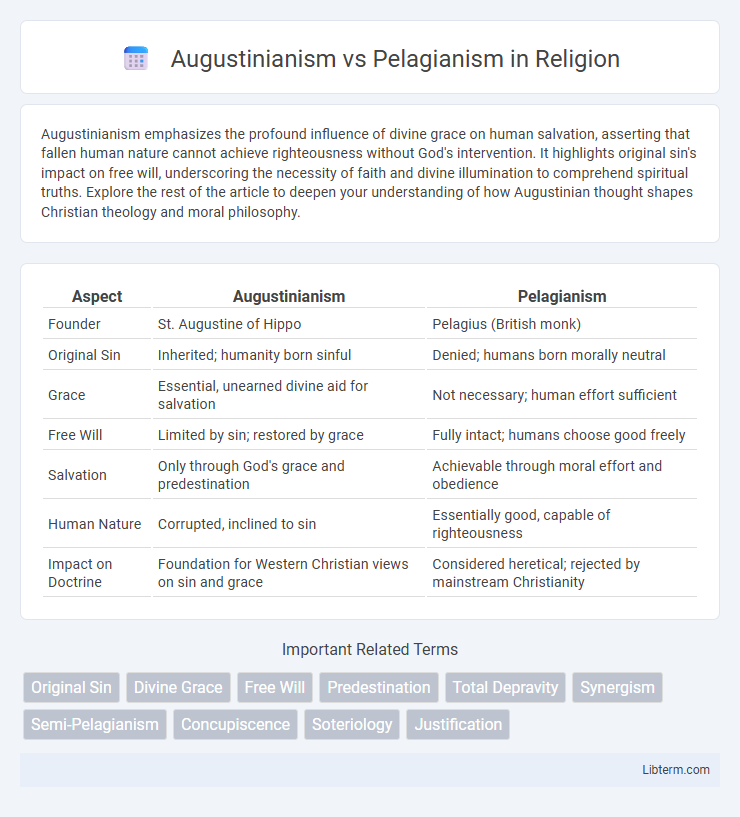Augustinianism emphasizes the profound influence of divine grace on human salvation, asserting that fallen human nature cannot achieve righteousness without God's intervention. It highlights original sin's impact on free will, underscoring the necessity of faith and divine illumination to comprehend spiritual truths. Explore the rest of the article to deepen your understanding of how Augustinian thought shapes Christian theology and moral philosophy.
Table of Comparison
| Aspect | Augustinianism | Pelagianism |
|---|---|---|
| Founder | St. Augustine of Hippo | Pelagius (British monk) |
| Original Sin | Inherited; humanity born sinful | Denied; humans born morally neutral |
| Grace | Essential, unearned divine aid for salvation | Not necessary; human effort sufficient |
| Free Will | Limited by sin; restored by grace | Fully intact; humans choose good freely |
| Salvation | Only through God's grace and predestination | Achievable through moral effort and obedience |
| Human Nature | Corrupted, inclined to sin | Essentially good, capable of righteousness |
| Impact on Doctrine | Foundation for Western Christian views on sin and grace | Considered heretical; rejected by mainstream Christianity |
Understanding Augustinianism: Core Beliefs
Augustinianism centers on the doctrine of original sin, asserting that humanity inherits a sinful nature from Adam, which makes divine grace essential for salvation. It emphasizes predestination, where God's grace is both necessary and sufficient to achieve redemption, rejecting the Pelagian view that humans can attain righteousness through their own efforts. This theology profoundly shapes Western Christian thought by highlighting human dependence on God's grace over human free will.
Defining Pelagianism: Essential Teachings
Pelagianism asserts that human beings possess the innate ability to choose good without the necessity of divine grace, emphasizing moral responsibility and human free will. It denies original sin by claiming that humans are born morally neutral, able to achieve salvation through their efforts alone. This doctrine contrasts sharply with Augustinianism, which upholds the inevitability of original sin and the essential role of divine grace for salvation.
Historical Backgrounds: Origins of the Doctrines
Augustinianism originated in the early 5th century from Augustine of Hippo's theological response to Pelagianism, emphasizing original sin's impact on human nature and the necessity of divine grace for salvation. Pelagianism, attributed to Pelagius, a British monk active in the late 4th and early 5th centuries, rejected original sin and argued that human beings could achieve righteousness through free will without divine aid. These conflicting doctrines emerged amid debates on morality, free will, and grace within the early Christian Church, profoundly shaping Western theological thought.
Human Nature and Original Sin: Contrasting Views
Augustinianism teaches that human nature is inherently fallen and corrupted by Original Sin, inherited from Adam and Eve, making humans incapable of achieving salvation without divine grace. Pelagianism denies Original Sin's effect on human nature, asserting that humans are born morally neutral and possess the free will to choose good without the necessity of divine grace. These contrasting views shape differing theological understandings of human moral responsibility and the need for salvation.
Grace and Free Will: Divergent Theologies
Augustinianism posits that divine grace is indispensable for human salvation, asserting that original sin severely impairs free will, making God's grace necessary to initiate and sustain spiritual transformation. Pelagianism emphasizes human free will and moral responsibility, arguing that individuals can choose good without the necessity of divine grace, thus downplaying original sin's impact. The theological divergence centers on whether grace is a prerequisite for righteousness (Augustinianism) or if human effort suffices for salvation (Pelagianism).
Salvation: Role of Faith and Works
Augustinianism emphasizes salvation by grace through faith alone, asserting that human will is incapable of achieving salvation without divine intervention, while good works are seen as a result of genuine faith. Pelagianism argues for the inherent ability of humans to choose good and attain salvation through their own efforts and moral works, minimizing the necessity of divine grace. The contrasting views highlight Augustine's doctrine of original sin and predestination versus Pelagius' belief in free will and human moral responsibility.
Key Figures: Augustine vs. Pelagius
Augustinianism, founded by St. Augustine, emphasizes original sin and the necessity of divine grace for salvation, asserting human nature's inherent corruption and inability to achieve righteousness independently. Pelagianism, advocated by Pelagius, denies original sin's impact, promoting human free will and moral capability without the essential need for divine grace. The theological conflict between Augustine and Pelagius centers on the nature of sin, grace, and human responsibility, shaping Christian doctrines on salvation and divine intervention.
Church Responses: Councils and Condemnations
Church responses to Augustinianism vs Pelagianism were marked by significant councils and condemnations that shaped Christian doctrine. The Council of Carthage in 418 condemned Pelagianism as heresy, affirming Augustine's teachings on original sin and divine grace. Subsequent councils and popes consistently upheld Augustinian doctrine, reinforcing the belief in human depravity and the necessity of grace for salvation.
Lasting Impact on Christian Thought
Augustinianism profoundly shaped Christian doctrine by emphasizing original sin and divine grace as essential for salvation, influencing Western theology and practices. Pelagianism, which denied original sin and asserted human free will's sufficiency for righteousness, was declared a heresy but sparked ongoing debates about grace and morality. This clash between divine grace and human effort continues to impact theological discussions on salvation, free will, and ethical responsibility within Christianity.
Modern Relevance: Augustinianism and Pelagianism Today
Augustinianism remains influential in contemporary theology by emphasizing original sin and the necessity of divine grace for salvation, shaping modern Christian doctrines on human nature and predestination. Pelagianism, though historically deemed heretical, resurfaces in debates on free will and moral responsibility, especially in discussions about human ability to achieve goodness without divine intervention. The ongoing tension between these views impacts ethical frameworks, pastoral care, and the interpretation of grace in various Christian denominations.
Augustinianism Infographic

 libterm.com
libterm.com